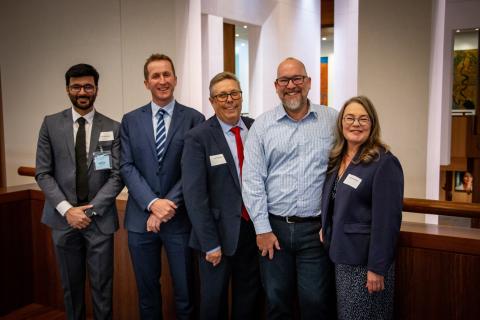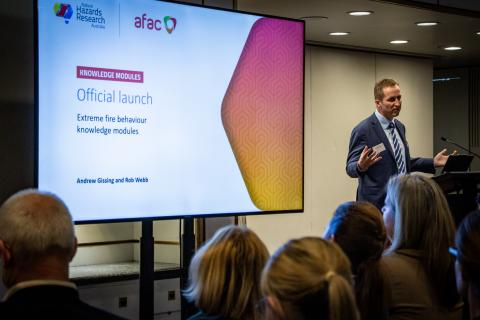


Parliament House Canberra played host to Natural Hazards Research Australia’s (the Centre) second stakeholder event for the year. More than 80 stakeholders were treated to keynote addresses from state and national leaders, as well as insights and preliminary findings from Centre research with potential to drive innovation and improvement. The event also marked the launch of the extreme bushfire behaviour knowledge modules.
Stakeholder forums are strategically held four times a year across the country to connect with end-users of our research, share new knowledge and listen to local perspectives. April’s Canberra stakeholder forum was an opportunity to hear from Wayne Phillips (Commissioner, ACT Emergency Services Agency) and Rob Webb (CEO, Australasian Fire and Emergency Services Council).
Commissioner Phillips spoke to the importance of natural hazards research for Canberra and the challenges of communicating the urgency for research tailored to practice, while Rob Webb delivered a thought-provoking keynote on the importance of strategic, long-term thinking, investing in the next generation of thought leaders and harnessing the power of technology such as artificial intelligence in a changing environment.
Lead researchers Prof Paula Jarzabkowski (University of Queensland) offered up emerging trends, patterns, themes and progress on the Evaluating the Resilient Homes Fund project and Dr David Henderson (James Cook University, Cyclone Testing Station) discussed Tropical Cyclone Alfred: early insights and implications for future policy and practice. While PhD candidate, Adeel Akhtar (University of Tasmania) spoke on the application of emotional intelligence in emergency management for improved trust building and decision making.

Photo: (from left) Adeel Akhtar, Andrew Gissing, Iain MacKenzie, Dr David Henderson, Prof Paula Jarzabkowski
Part of the Centre’s commitment to supporting the translation of research into practice, the newly launched Extreme fire behaviour knowledge modules are designed support the ongoing professional development of experienced fire behaviour analysts, environmental prediction services meteorologists and decision support meteorologists to improve their ability to evaluate extreme fire behaviour risk and provide operational guidance and fire weather intelligence.
The knowledge modules are the practical application of Centre research undertaken following the destructive 2019-20 Black Summer fire season, where fire conditions were at times driven by complex interactions between the fire and the atmosphere that produced extreme local fire behaviour, which was extraordinary and challenging to firefighters.
The knowledge modules are designed for fire behaviour analysts and specialist meteorologists to enhance risk evaluation, operational response and fireground safety.
“The modules were developed to improve the evaluation of extreme fire behaviour risk and to provide required operational guidance and fire weather intelligence to inform operational response and fireground safety.” Prof Cheryl Desha, Science and Innovation Director Natural Hazards Research Australia
Information within these knowledge modules may also be relevant to researchers and students studying fire science.
Using advanced super-computer simulations, the project and subsequent knowledge modules were developed with the support of Dr Mika Peace (Bureau of Meteorology), Predictive Services Specialist Chris Morton (Department of Energy, Environment and Climate Action, Victoria) and Curio. Meteorology and bushfire behaviour models were compared to understand the processes driving challenging and destructive fires and how both the fire and weather change in response to each other.
The knowledge modules cover:
Further information about the research project and analysis can be found at Modelling fire weather interactions using the ACCESS-Fire model.
Completing these modules provides valuable information about complex fire behaviours and promotes effective collaboration between fire behaviour analysts and meteorologists. By drawing on their different expertise and intelligence sources, they can better assess and predict risk factors during bushfires. The modules draw on the current practice of experienced fire behaviour analysts and meteorologists, illustrating how they have worked together during recent bushfires.
